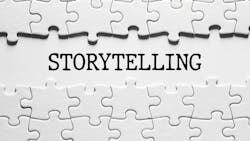Expert advice on how to use the simplest, most powerful business sales tool
It has been a while since anyone talked to me about the importance of business storytelling – using stories to communicate and connect with prospects and clients, helping to guide them toward making the right choices. I have spoken at the NAMA Show on the subject, written about it, and it is the topic in this episode of Automatic Merchandiser’s Vending & OCS Nation Podcast.
In the last decade, storytelling became cool, as sales gurus jumped on the bandwagon, doing whatever they could to complicate a simple concept. Despite what the experts tell us (to sell books and secure speaking gigs), storytelling is not that complicated, but it is absolutely essential – a communication skill that operators, their sales teams and their customer service people need to use. Storytelling expert Todd Dewitt agrees. He speaks globally about the power of business storytelling.
An expert opinion
"Business is about relationships,” said Dewitt. “We're wired as a species to understand stories. We must learn how to deal with spreadsheets, charts, graphs, numbers and everything involved in big data these days. We can learn those – and we must learn those – but if you want to move someone, if you want to create change, you can't just logically appeal to others. Stories matter in business because innovation and change rest on tapping people emotionally, and that's what stories do.”
Dewitt added: “They might not remember what you say, but they will remember how you made them feel. That's a useful thing to remember if you're ever trying to make a pitch of any kind. When a speaker elicits emotion from their audience, they tend to remember the material better in general. They tend to be more likely to take action when they have been emotionally stimulated.”
He also pointed out that a speaker who makes an emotional connection with his audience gets a higher rating. “You could have a world-class speaker who is very polished and factual, but not emotionally connecting with the audience. They will be rated lower than a person who knows less but is great at connecting with the audience and stirring up useful, interesting emotions.”
Why storytelling makes sense
There is a good reason to use storytelling when communicating with prospects and clients. If a client or a prospect has an idea about how things should happen, but is obviously looking in the wrong direction and needs to be put back on course, there are two ways to deal with the situation:
(1) You can hit them right between the eyes by telling the client or prospect, “You are making a bad choice, and here is why it is a bad choice.” Or (2), you can tell them a story that will help them visualize and better comprehend your position.
Keep the fundamentals of storytelling in mind as well.
- Your story should be true.
- There needs to be a main character.
- There should be a beginning, a middle and an end.
- Your story should be relevant.
- Do your best to make the story engaging, even compelling.
Dewitt said that storytellers need to avoid making certain basic mistakes, which he sees all too often.
“Acting is a problem. You're just supposed to be you or the best, liveliest version of yourself. Don't be too polished. There's a place in business to be polished. Storytelling is not one of them. The other mistake I would say that I see a lot is self-aggrandizing. A lot of people say, ‘You know, when I first started,’ or some other lead in like that,” Dewitt explained.
“There's a place for that too, but it better be a small part of what you do because no matter who you are or how good a speaker you might be, you can turn people off quickly. If you're going to talk about yourself, you should be making fun of yourself, self-deprecating, a lesson you learned when you screwed up, something real and full of humility that people can relate to.”
A factual approach
Here is a fundamental example of a factual conversation compared to storytelling. A client tells you that they need to upgrade their office refreshment program to make it more appealing to the employees, but they want to keep costs under control. You can certainly list the possibilities for them – a single-cup brewer, cold brew coffee, flavored creamers, a stylish Borg & Overström water dispenser and a subsidized micro market.
A storytelling approach
Or, you can tell them a story about what another client did, xyz company, that’s similar to them, who shared the same objectives and concerns. “Jane, the office manager really wanted to elevate their program, so we suggested a single-cup brewer using local roasters, and the reaction was incredible. Jane was thrilled there was no waste, but especially happy about the cost per cup. Plus, she was inundated with positive emails when they added cold brew and flavored creamers. The water system we brought in blew everyone away, and it was so well-received; bottled water was removed for additional savings. Then, Jane opted for a subsidized micro market because she had the same concern about the pantry service budget. It was a huge success. It’s turned out to be 25% of the cost of a pantry service, but by emphasizing the subsidy on the fresh and frozen food, employees are staying in for lunch more than ever – another objective that was shared by both you and Jane.”
Telling a story that allows the listener to visualize the scenario makes a difference. Dewitt notes that it is a good idea to have an arsenal of stories prepared, well-rehearsed and ready to use in many situations.
About the Author

Bob Tullio
Bob Tullio is a content specialist, speaker, sales trainer, consultant and contributing editor of Automatic Merchandiser and VendingMarketWatch.com. He advises entrepreneurs on how to build a successful business from the ground up. He specializes in helping suppliers connect with operators in the convenience services industry — coffee service, vending, micro markets and pantry service specifically. He can be reached at 818-261-1758 and [email protected]. Tullio welcomes your feedback.
Subscribe to Automatic Merchandiser’s new podcast, Vending & OCS Nation, which Tullio hosts. Each episode is designed to make your business more profitable.

